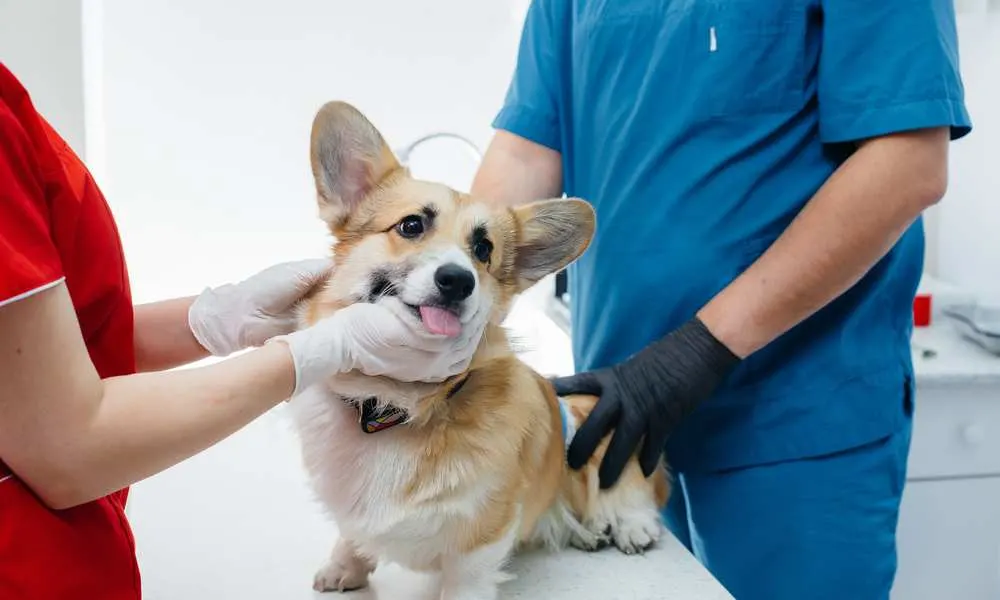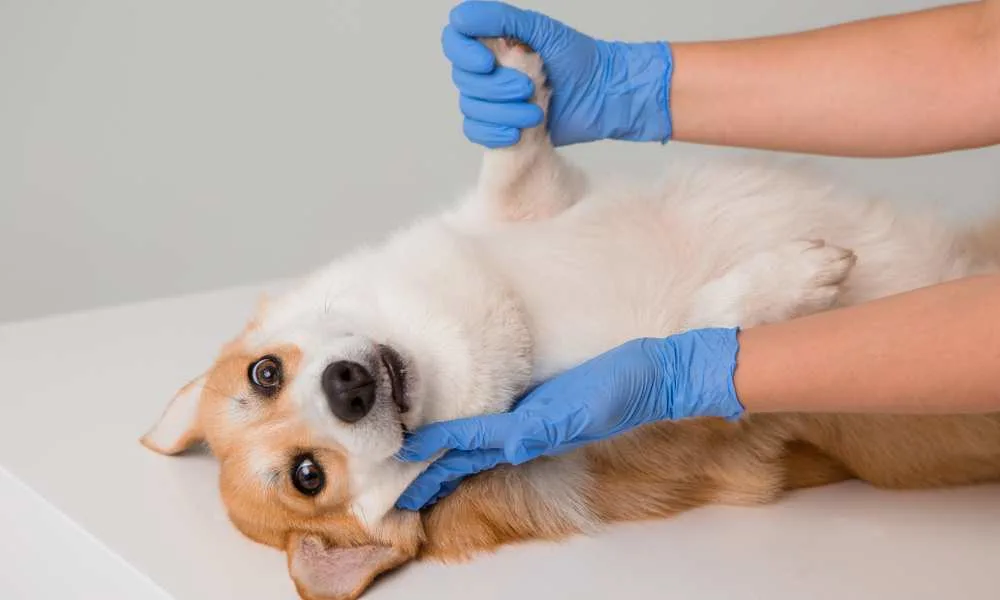It is very important throughout your pet’s life to take care of his health and go on regular check-ups. While some breeds are healthier, others still require a little more medical attention, and that’s okay.
Since we are currently talking about corgi dogs, they belong to that category of dogs that are prone to various diseases during their lifetime.
For example, bladder stones in corgis are a very serious problem. Therefore, it is very important that your corgi visits the vet regularly in order for this problem to be discovered and treated in a timely manner.
If you are worried about the health of your corgi, or more precisely, any bladder problems he might have – continue reading this article, and we will do our best to answer all your questions.

Do Corgis Suffer From Bladder Stones?
One of the most common health problems with corgi dogs are issues concerning their backs. However, these breeds deal with many more severe cases – bladder problems. If you have been wondering:
Do corgis get bladder stones? the answer is yes. Sadly, this is not so easy to take care of.
Barbara S. Merickel, who is the head of the Cardigan Welsh Corgi Club Of America Health Committee, explains how certain breeds – the corgi breed – end up with this problem.
The Cardigan Welsh Corgi, along with many other breeds, has a problem with this. Bladder stones are developed in a dog’s organism with a defect that allows the acid urine to pass through. This is very dangerous because it poses a threat to the entire organism.
Luckily, these bladder infections can be dissolved with a proper diet, but only if discovered in time. Bladder problems with any dog breed will require constant medical care and medication in order to prevent the stones from forming again.
For you to discover this disease in time, you will have to take your dog to do a genetic test for cystinuria. So far, these tests have only been developed for Labradors and Newfoundlands. The Committee is expecting them to be made for the corgi dog as soon as possible.
Since there are separate tests made for each breed, it can be concluded that the bladder stones in corgis are indeed a genetic problem. This should warn the potential owners to be even more careful when buying a corgi puppy from a mother who has had this problem.
Another reason that can considerably affect the progress and degree of danger concerning bladder stones may be accommodating your dog to an unhealthy diet containing ingredients like rice or soybean hulls. So, here is another warning – pay attention to what you are feeding your dog.

Types and Treatment
Bladder stones or otherwise known as uroliths are large lumps in the form of a rock that is found in the dog’s urine. These stones vary in size and number – a dog can have problems with one large stone or numerous small ones – it depends solely on the dog himself. It is essential to mention that these stones can also be found in the dog’s kidneys.
There are three types of stones a dog can suffer from:
- Struvite bladder stones – this type of stones occur when the struvite in the dog’s urine doesn’t dissolve properly. Struvite bladder stones are caused by bacteria that produce the so-called urease. This is more commonly found in female dogs rather than males. You can treat struvite bladder stones by feeding your dog a particular diet, taking part in surgical or non-surgical removal. The best way would be to go with surgery because it is the fastest way to get rid of this problem.
- Calcium oxalate stones – this type of stones are crystals formed by an improper concentration of urine. Calcium oxalate stones occur due to a cystitis infection, and the most common signs are blood in the urine or straining to urine. This type is a bit more dangerous than the previous one, and once you discover them, your dog should undergo surgery before it becomes life-threatening. Another solution is ultrasonic dissolution – involving high-frequency ultrasound waves that break the stones into small particles so that your dog can remove them naturally from his organism.
- Uric acid stones – this type is actually the result of a genetic abnormality caused by a defect in the dog’s urine. The problem occurs when the acid becomes overly concentrated. The signs are the same as with calcium oxalate stones, but this type is that common. This can be very painful for the dog, and you can discover it by X-rays. You can treat this in two ways: by surgery or by urohydropropulsion – a technique using a special urinary catheter. If a dog is dealing with a larger stone or stones, surgical removal is recommended.
Your vet will give you four choices of dealing with bladder stones:
- Diet and medication – with cases that are not so serious, the doctor might prescribe a dog a healthy diet and some antibiotics if it is needed. However, if your dog’s case is severe, do not go with just a diet.
- Catheterization – this is common for male dogs with a large bladder stone. This is a good choice because, with the right anesthetic, it is not painful for the dog.
- Surgery – this is the most common and preferable option. Surgical removal is necessary when the stones cannot be removed in any other way. Also, this is basically the least painful method of all.
- Urohydropropulsion – this is a less common medical procedure that involves filling the dog’s bladder with fluid and using a urinary catheter. Bear in mind that this should only be the option when the dog is dealing with smaller stones that can be pushed out.
No matter the treatment you opt for, this condition requires regular check-ups with the professional. Your dog can either recover from this really fast, or he may develop some health problems which need to be taken care of by some additional medication.

Causes
There are four factors that can cause your corgi to suffer from bladder stones, and here they are:
- Chronic urinary tract infections – this is the most common cause, and it is most common with female dogs. It is caused by bacteria that produce urease. In some cases, it can even lead to bladder cancer. An abdominal ultrasound is required to assess the seriousness of the infection and further treatment. This type of infection can be treated surgically.
- Diet and urine pH – as we have already mentioned earlier, a dog’s urine is affected by the type of diet he is accustomed to. If the diet is poor and contains ingredients like rice, your dog’s urine pH can worsen. Urine with a 7.0 pH or higher can lead to bladder stones.
- Mineral concentration – the minerals in a dog’s urine are also connected to the type of food he consumes. More precisely, it is about the quantity of water your water consumes during the day – the less water your dog consumes, the higher the chances of crystals forming are.
- Genetic factors – just like we said in the beginning, this is a genetic condition, and if you are breeding puppies from a corgi who has already suffered from this problem – you should consult a vet right away.

Diagnosis
You can start doubting that your corgi is having problems with bladder stones if you come across certain symptoms. They can be grouped into main and additional symptoms according to their frequency.
| Main symptoms | Additonal symtpoms |
|---|---|
| Frequent urination | Irritability in the abdomen area |
| Straining to urinate | Loss of appetite |
| Painful urination | Reduced activity |
| Blood in the urine | General weakness |
No matter if you notice that your corgi is suffering from painful urination or reduced activity, you should take him to the vet as soon as possible to get the exact diagnosis.

Bladder Cancer In Corgis
Since corgi dogs are one of the few breeds which are prone to problems with bladder stones, this disease can easily culminate and turn to bladder cancer – and this is where it gets tricky. Even though these cases are rare, they can still happen, and if you don’t discover this while it is still in the early stage, it can be a problem.
This is medically referred to as transitional cell carcinoma – invading the uterus and obstructing the urinary tract. This will quickly spread and disrupt the urine’s entire flow, and it can affect almost any organ in the dog’s organism.
The symptoms are almost identical to those which occur with bladder stones, and they include difficulty while urinating, blood, and inability to urinate.
With bladder cancer in dogs, there is the early and the late stage. Of course, it would be best if you discovered it while it was still in the early stages.
Here are the symptoms for both stages:
Early-stage symptoms:
- Straining to urinate
- Bloody urine
- Redness or swelling
- Decreased appetite
Late-stage symptoms:
- Vomiting
- Weight loss
- Pain in the abdomen
- Difficulty to walk
- Consistent pacing
- Anorexia (rare cases)
- Aggressive behavior
There are so-called crisis cases where a dog goes through an immediate worsening of a condition that can be life-threatening. This includes difficulty breathing, prolonged seizures, sudden collapse, or external bleeding.
If you notice any of this – seek immediate veterinary assistance.
Bladder cancer is dogs can be treated in 3 ways:
| Chemotherapy | The aim of chemotherapy is attacking the growing cells and destroying them. This can be done alone or with additional interventions, and it depends on the stage your dog is dealing with. The length of the treatments depends – some dogs might be done with this after a couple of months, and others might have to continue with this for the rest of their life. |
| Radiation therapy | This involves a high dose of radiation in order to destroy the tumor cells. It is best for tumors with dividing cells. This should be used only if the pet is under proper anesthetic. Bear in mind that there can be some possible side-effects. |
| Medication | Among some of the most common agents used in chemotherapy are: doxorubicin, mitoxantrone, and vinblastine. These are all used for minimizing pain. |
Lucky for you, the corgi breed is not on the highest risk breeds. Here, you have:
- Australian Cattle Dog
- Australian Shepherd
- Bichon Frise
- Rat Terrier
- Russel Terrier
- Beagle
There is no scientific reason for why these breeds are under the threat of highest risk, but there are a few unproven theories.
Some say that living in a household where smoking is frequent has a great influence on your dog’s health. Others, however, put the blame on obesity and pesticides.
One thing is certain – this occurs between the ages of 6 and 11.

CADET Braf Test
A CADET Braf Test evaluates dog urine for the presence of mutating cells containing bladder cancer. This is an up-to-date test that can be taken almost everywhere. This test is both accurate and sensitive, so the results you get are reliable.
Professionals recommend that this test should be done for up to 8 years of your dog’s life. If you take this test in time and it shows positive, you will be able to engage in proper treatment methods before the situation worsens.
For a request form for this test, click this link
Learn More: Do Corgis Get Cancer? Are Corgis Prone To Cancer?

A Healthy Diet
There is no dispute in that a healthy diet has a tremendous effect on a dog’s diet. Like you, your corgi needs his daily dose of proteins and vitamins to stay healthy.
The average weight of a corgi is somewhere between 25 and 27 pounds – depending on the gender. According to calculations, an average 25 pound corgi needs a daily intake of 780 calories. A corgi dog loves to eat, so don’t be amazed when he asks for more food than you prepared.
In your search for proper dog food, look for the following ingredients:
- Proteins: an ideal dog food will have a list of 2-3 proteins contained, and you are likely to find this composition in chicken, fish, lamb, etc.
- Fat: every dog needs a certain amount of fat. Omega-3 fatty acids will definitely contribute to a healthy coat for your dog.
NOTE: avoid including corn, wheat, and rice in your dog’s diet.
The choice for best dog food differs with age. Here are the best options for a puppy, adult, and senior corgi.
For corgi puppies: Fromm Puppy Gold Formula – no corn, wheat or soy included, good for brain and eye development.
| Main ingredient: | Chicken |
| Fat: | 18% |
| Fibers: | 5.5% |
| Calories: | 417 |
| Protein: | 27% |
For corgi adults: Orijen Original – “biologically appropriate”, full of vegetables, and low-glycemic.
| Main igredient: | Turkey |
| Fat: | 18% |
| Fibers: | 8% |
| Calories: | 470 |
| Protein: | 38% |
For corgi seniors: Orijen Senior Dog – contains 80% meat and fish, low carbs, and good for your corgi’s joints.
| Main igredient: | Turkey |
| Fat: | 15% |
| Fibers: | 8% |
| Calories: | 445 |
| Protein: | 38% |
Besides eating healthy food, you should make sure that your dog consumes enough water throughout the day. But, how do you exactly do this?
There are two types of dogs – the over-drinkers and the under-drinkers.
A healthy dog should drink about 1 ounce of water per pound of bodyweight a day. Puppies need ½ a cup every two hours because they are more energetic and need to stay hydrated.
During the summer, you should ramp up the intake of water, regardless of the dog’s size and weight.
Read More: Genetic Diseases In Corgis

Conclusion
We have determined that corgis are not the healthiest breed out there, and they are prone to many health issues during their lifetime. Let’s take bladder stones, for example. This is a serious problem, and if your corgi has a problem like this, you should seek help from a vet.
Precisely speaking, there are three types of bladder stones in corgis: struvite bladder stones, calcium oxalate stones, and uric acid stones. The second type is the most dangerous, and it requires surgery once you discover it. Bacteria cause all types of bladder stones in the dog’s urine, which affects the entire dog’s organism.
There are four factors that can cause bladder stones in corgis, and they are: chronic urinary infections, improper diet, and bad urine pH, mineral concentration, and of course, genetic factors, which are inevitable.
Although the chances for a corgi breed are small, he can have bladder cancer. This is a serious condition in which the carcinoma cells invade the urinary tract and disrupt the entire blood flow. The symptoms can be divided into early and late-stage symptoms, and treatment can be done through chemotherapy, radiation therapy, or medication.
A CADET Braf Test is a test which estimates the chances of mutating cells in your dog’s organism, and it has proven to be accurate and sensitive.
In order for your dog to lead a healthy life, he must eat healthily and drink a lot of water – just like us, humans. When searching for dog food, it is essential to look for the one with a considerable amount of proteins and fat.
Learn More: Corgi Health Problems: Most Common Diseases In Corgis

